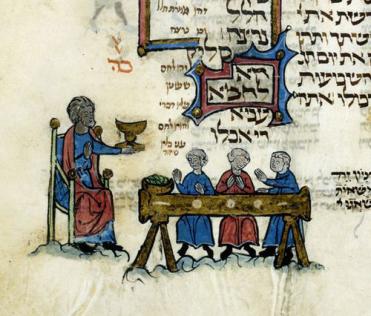Every week, parshaoftheweek.com brings you a rich selection of material on parshat hashavua, the weekly portion traditionally read in synagogues all over the world. Using both classic and contemporary material, we take a look at these portions in a fresh way, relating them to both ancient Jewish concerns as well as cutting-edge modern issues and topics. We also bring you material on the Jewish holidays, as well as insights into life cycle rituals and events...
The Passover Seder begins with the Aramaic invocation הא לחמא עניא – this is the bread of affliction, or of poverty. This refers to the matzah, the central player in the Passover ceremony, and reflects the fact that this was the bread fed to the Israelite slaves by their Egyptian masters: cheap, quick and easy to produce, not too tasty but filling, and easy to ship. It is the opposite of leavened bread, which is fancier, airier, more expensive and time-consuming to make; the bread of the rich and powerful. The matzah, therefore, is a reminder of our affliction, our lowly status in Egypt. In this opening, prefatory piece, we point to it as the central element of the meal we are about to eat and the ritual we are about to perform, and invite all who are hungry, all who are in need, to come and join us for the Seder.
The difficulty is that the matzah as a symbol of our affliction is not, it would seem, its primary ritual purpose. The matzah, the Torah explains, is a reminder of the miraculous speed of our redemption: God took the Israelites out of Egypt so quickly, so surprisingly, that the dough they brought with them did not have time to rise. The matzah, therefore, is first and foremost a symbol of the notion of ישועת ה' כהרף עין – God’s salvation comes in the blink of an eye. That is what the matzah is basically about – our poverty and suffering in Egypt would seem to be a secondary, additional element of the matzah’s symbolism; interesting, and helpful, but not the central lesson that we want to communicate. (In fact, the phrase לחם עוני is understood by some Rabbinic sources to NOT mean bread of affliction, but, rather, the bread that is much discussed, much talked about, referring to the lengthy discussion that takes place at the Seder. Another understanding refers to its size or method of baking.) Why, then, do we begin the Haggadah with this apparently secondary message of the matzah, that of bread of affliction? Why do we introduce it in this basically ‘incorrect’ way, rather than with its primary meaning?
In discussing the opening “This is the bread off affliction” piece, The Abarbanel makes a lovely point: when, at the opening of the Seder, we invite those less fortunate to join us for the Seder, which, he reminds us, is a costly affair, we emphasize the lowliness of the matzah, and the concomitant lowliness of our status in Egypt, as if to say: in Egypt, we were all poor, we were all afflicted. The fact that right now I am a well-off householder, able to invite others to join me in my Seder, is a transient situation. Like you, I was also once poor. We all were. Please don’t be embarrassed by this invitation from an apparently wealthier host – underneath, we are all the same, we are all from a once enslaved, impoverished nation, and what we will eat tonight, the matzah, reminds us all of that.
I think it’s lovely, and telling, that this attempt to put the less-fortunate guest at ease by pointing to the matzah as the bread of affliction, which we will all eat together tonight, emphasizing the lowly status we all once shared, usurps the matzah’s primary identity for a while – we will not hear about the speediness of the exodus, which prevented the dough from rising, until much later in the Haggadah. This editorial decision, like so much else in our tradition, underscores our concern for social justice and communal solidarity, above and beyond any ritual or theological points we want to make. First we talk about the matzah as a symbol of our shared peoplehood, our egalitarian understanding of who we all our, of our common (in both senses) background; only later we remember that the matzah is also about what God miraculously did for us in Egypt.
The decision to edit the Haggadah this way, and emphasize our social solidarity first, and our theological beliefs only later, is what we must apply, as well, to the notion of Passover as a holiday of freedom: it is primarily about freedom as a value, and guaranteeing the freedom of allIt is to that belief that we should be dedicating ourselves this Pessach .
חג שמח



Get inspired by Pesach Divrei Torah from previous years